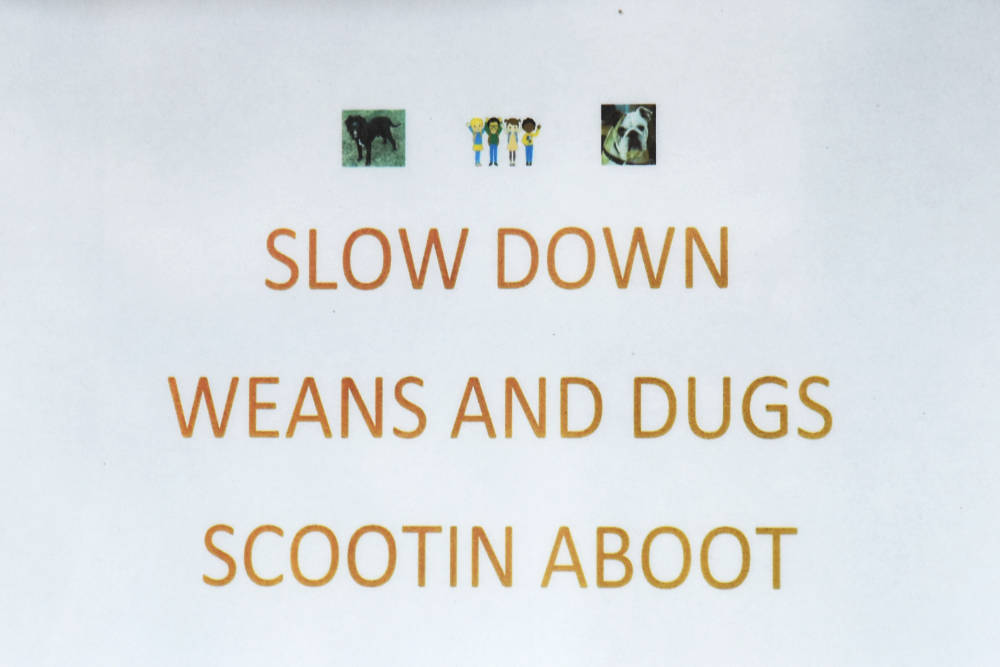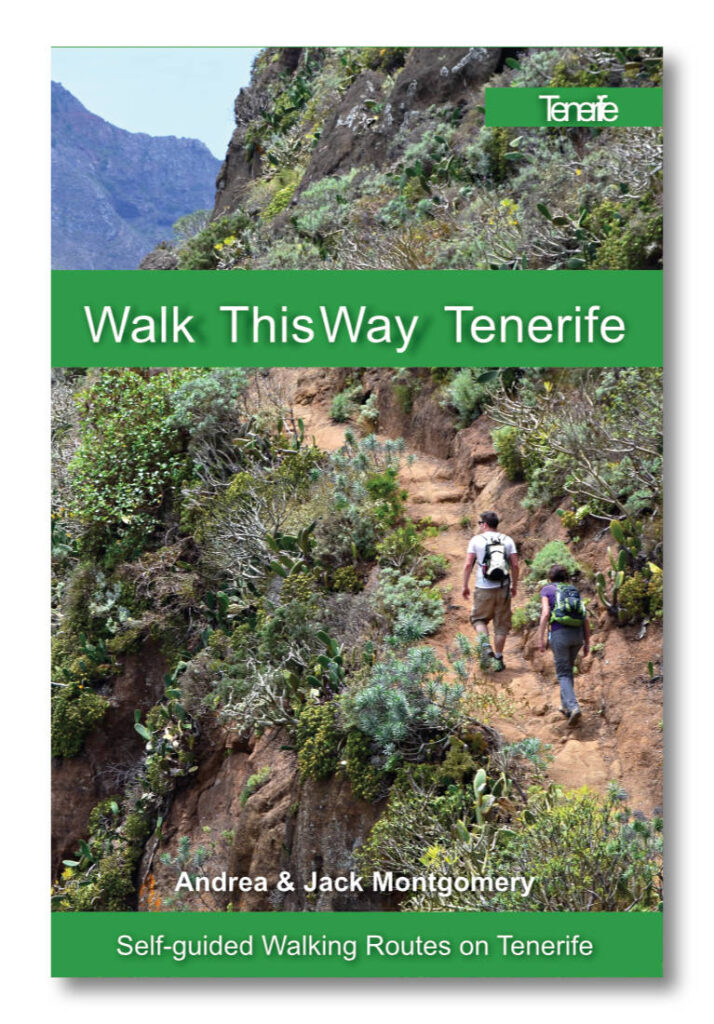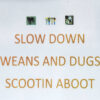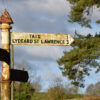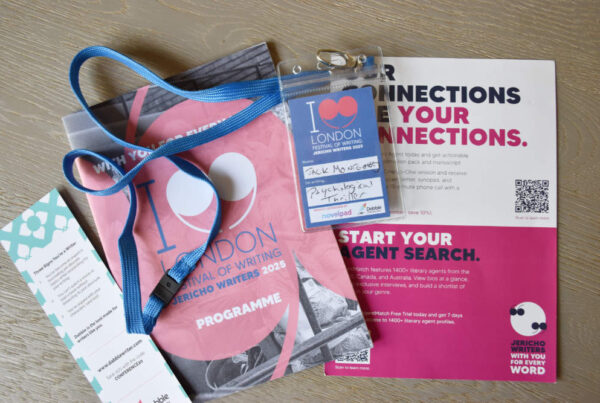Jings, crivens, help ma boab! Some thievin’ wee bastard has made off with mah accent.
This week, prompted by author Harry Bingham’s weekly newsletter, the group of writers I’m a member of discussed the use of accents in written dialogue. The gist of it was about the need for writers to be respectful of non-standard speech and not turn their characters into cartoon caricatures. Basically, none of that ‘God Moaning. The resist-once have accqo-aired a bum. They are going to ex-plod the whaleway brodge.’ That’s a line of dialogue from the 1980s British TV series ‘Allo ‘Allo! It sounds ludicrous now, but some writers still stray into ‘vee haf vays of making you talk’ territory.
Writing other languages
Trying to accurately write regional dialects and other languages is fraught with danger. Both Andy and I are working on books which include differing dialects and accents. We regularly ponder whether we’ve got it right. In my book Camel Spit & Cork Trees, about our first year in Portugal, Portuguese characters speak Portuguese – “Tudo bem? Nao escorpiões? Nao vespas?” – when the sentence is short and I want impact. When it’s longer paragraphs, I write their dialogue in standard English, automatically translating for the reader. Whether that’s right or wrong is debatable. What I try to avoid is making them sound like they’re in an 80s sitcom.
My grasp of Portuguese isn’t good enough to capture the nuances of regional differences, so I steer well clear. However, I understand Spanish enough to spot some regional dialects … up to a point. By the Time Dawn Breaks has a smattering of Spanish words and phrases. Some reflect Canarian dialect – ‘The locals were so laid back they couldn’t even be bothered to complete many of their words. So, más o menos was máh o menoh, and dos became daw. It was as if the letter S was banished for committing some unspoken sin.’ Even so, I keep it to a minimum. Less is more when it comes to ‘borrowing’ the language of others.
Which brings me to the aspects of the online debate which had me painting the Saltire across my face.
Look & listen
I lived and worked in Greater Manchester for eighteen years and have lived in the South West of England for four. There’s no way I’d try to write great swathes of dialogue which attempted to portray the regional dialects of either. I’d get something wrong, even if I researched until I was blue in the face. If I did write a character who was from either region, I’d throw in an appropriate word or phrase every now and again to reflect this. So, I was surprised to find a sizeable number of non-Scottish writers attempting to write in-depth Scottish dialogue. Scottish wasn’t the only language/regional dialect that was ’borrowed.’ But, for some strange reason, there were more examples of it than any other. It’s either very brave or terribly naïve to attempt to write unfamiliar dialect. Even though it’s the language which flows from my mouth, I constantly question whether I’ve got the balance right whenever putting words into the mouths of characters who use Scottish words and phrases.
As is the case with most countries, there is not one accent to rule them all. I come from the Isle of Bute. Brandanes (people from Bute) speak Scottish with a mix of West of Scotland, Glasgow, and Highland influences. On Islay, only sixty kilometres due west as the crow flies, the accent is softer, more Hebridean. When my friends and I met up with Army Cadets from Islay at our annual camp, we mocked their Teuchter accents. Travel east to the mainland and it is different again, closer to Glaswegian, though not as harsh. The author Andrew O’Hagan grew up in Kilwinning, just thirty kilometres from Bute. Part of his novel Personality, based on Lena Zavaroni, is set in Bute’s main town. Yet, the language of his Rothesay characters didn’t always ring true to me. It wasn’t a dealbreaker, and I got over it quickly, but it did register. That’s the point of mentioning this; regional dialects are nuanced, whether Scottish, English, Welsh, Irish or whatever. Non-native speakers might not notice, but native speakers will, and it’s their view which should be most important.
Handle with care
Most extracts including Scottish dialogue conveyed the feel of the language in one way or another, some more successfully than others. There were occasional bloopers – overuse of Old Scots veering into caricature territory; deploying words which nobody in Scotland uses. Some reflected AI’s approach to writing Scottish, mixing words from across the country – the equivalent of an English character using Scouse, Manc, Cockney, Geordie, and Brummie terms in the same sentence.
Examples which were clearly thoroughly researched worked best. But some others came across as authors writing what the language sounded like to them rather than how it really is. It begged the question why? Why have characters speaking a dialect in which they weren’t well versed? Witnessing my language being tortured, I understood why people feel so strongly about cultural appropriation. This wasn’t helped by a few other authors who, I’m sure with the best intentions of being supportive of fellow writers, occasionally contradicted native Scottish speakers by posting comments like ‘it sounded authentic to me,’ in the process unwittingly acting as enablers of misuse.
I wanted to shout, ‘How would you know? You’re not Scottish.’ No extracts were meant to be disrespectful, but there were times I felt frustrated and annoyed my language had been hijacked, then used and abused with blatant disregard for native speakers … and sound advice. This disregard was illuminating, even helpful. It will make me think more carefully about how I portray others who are different from me in one way or another.
Irrespective of specific dialects, any author attempting to write unfamiliar dialects in great detail should at least run their work past someone who actually speaks it.
